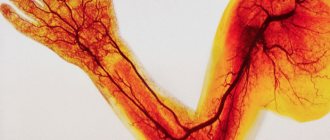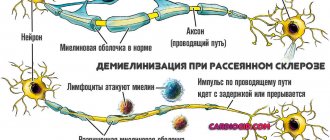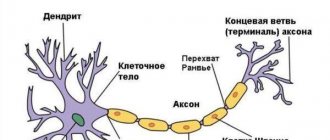Alcoholism in the modern world is recognized as a real disease, and so serious and insidious that both the “patient” himself and the people around him suffer equally from it. One of the most dangerous manifestations of addiction is psychosis, called “delirium tremens”, in a more accessible form – “delirium tremens”. This state can be called madness, and this corresponds to the very meaning of the word delirium (delirium in Latin - madness or insanity), as well as the painful state of the alcoholic’s psyche, manifested by a disorder of consciousness, unhealthy agitation, aggression and frightening visual and auditory hallucinations.
Alcohol delirium
What is delirium tremens
“Squirrel” is the common name for alcoholic psychosis. This phenomenon is observed in drunkards after a relatively long period of drinking alcohol, or with an abrupt cessation of alcohol intake. Delirium usually manifests itself with characteristic symptoms on the third or fourth day, much less often on the first or second day after the end of the binge.
If an alcoholic has suffered an attack at least once, a repeated visit to the “squirrel” is almost inevitable. Very rarely, the disease is recorded during intoxication. As you might guess, this is a kind of rebellion of an organism accustomed to alcohol against the fact that it does not receive its drug.
Causes of delirium tremens
The main cause of this pathology is damage to the central nervous system by toxins. A weakened liver cannot cope with them. Add symptoms of oxygen deprivation, and fertile ground for psychosis is ready. Causes of delirium include:
- Abrupt refusal of alcohol at the end of a long binge.
- One-time consumption of large amounts of alcohol.
- Drinking alcohol from surrogate ethyl alcohol.
- Prolonged heavy drinking.
- Complete or partial refusal to eat while drinking, protein fasting.
- Lack of quality medical care, without which it is impossible to cope with this condition.
- Ingestion of alcohol-containing compounds not intended for internal use.
The risk of developing squirrels after stopping binge drinking increases if the person has recently had a cold, suffers from any chronic disease, or has suffered a similar condition in the past.
The main risk group is alcoholics after 40 years of age. In young people, delirium tremens may occur much less frequently. Women degrade much faster than men. The alcohol “experience” of men, which is favorable for the development of symptoms of alcoholic psychosis, is about five years. For women, 3-4 years of drinking is enough for such grief. Cure from the problem of both is possible only with complete deliverance from addiction. It will take a lot of time.
Symptoms of delirium tremens
There are 3 stages of the development of the disease: threatening, accomplished and life-threatening stages of delirium.
How it begins
Stage 1 of the development of the disease begins in the first 2 days after leaving a more or less long-term binge. If at the initial stage the addict resumes consuming intoxicating drugs, the painful manifestations go away. The symptoms are as follows:
OUR READERS RECOMMEND! For quick and reliable relief from alcoholism, our readers recommend the drug “Alcolock”. This is a natural remedy that blocks cravings for alcohol, causing a persistent aversion to alcohol. In addition, Alcolock triggers restoration processes in organs that alcohol has begun to destroy. The product has no contraindications, the effectiveness and safety of the drug has been proven by clinical studies at the Research Institute of Narcology. Experts' opinion..."
- Feeling worse in the evening.
- Changeable mood: from depression to excessive talkativeness.
- The appearance of certain visual images.
- Low-grade fever. Sometimes it rises to 400, redness of the eyes and face, and increased sweating are observed.
- Trembling of fingers and toes.
At the first stage, the change in the patient’s physical appearance is weakly expressed. It is difficult to identify dangerous symptoms and distinguish them from ordinary illness. Only a specialist can recognize this. Therefore, people nearby need to be especially careful. Any behavioral oddities, suspicious symptoms, or changes in mental state should alert you.
Squirrel development
The second stage of the disease, which is called complete delirium, is distinguished by more pronounced symptoms. In addition to visual ones, tactile and auditory hallucinations are added. An alcoholic experiences intense fear. He is haunted by frightening images that he fears in everyday life: poisonous snakes, rats, spiders, armed criminals.
The person loses self-control and is focused on running away or protecting themselves from danger. The maximum duration of this stage is 2 days. The specific duration depends on concomitant diseases and injuries, and the duration of the binge.
The more severe the symptoms of stage 2 of delirium tremens, the faster the last stage, which is life-threatening, occurs. It is manifested by a lack of response to external stimuli, convulsions, and a drop in blood pressure. The risk of coma and cerebral edema increases. Changes occur in the functioning of many organs.
The prognosis depends on how quickly and efficiently medical care is provided. The outcome can be different: from complete recovery to death.
When to ask for help
If a person has managed to distinguish the signs of delirium tremens, one should not hesitate. You need to call an ambulance or go to a specialized clinic with detoxification services and call a doctor at home. Sometimes the patient feels more comfortable at home, which contributes to a speedy recovery.
Emergency assistance is needed in the following cases:
- Rapid rise in temperature.
- Symptoms indicating dehydration.
- Constant aggressiveness, dangerous for others and the patient himself.
- "Jumping" pressure.
An accurate diagnosis is made by a doctor who knows what to do in such situations. He also selects the necessary medications and their dosage. This allows you to prevent or minimize negative consequences.
Stages of the disease
Delirium tremens lasts on average 3-5 days. In narcology, it is customary to distinguish 3 stages of the disease. [3]
| Stage 1 (threatening delirium) | Hallucinations begin to appear mainly in the evening. At first, these are unclear visual illusions and increased anxiety, which further increase the patient’s sensitivity to external stimuli. The person is restless, practically does not sleep, does not eat at all, and talks to himself. There is a slight increase in body temperature and sweating. If an addict at the initial stage of delirium begins to drink again, then all symptoms gradually go away |
| Stage 2 (complete delirium) | Hallucinations become more and more vivid. Stories from patients about delirium tremens prove that these can be a variety of illusions - dead relatives, movie characters, friends, mythical creatures, animals. Hallucinations become so realistic that a person may completely lose touch with reality. The body temperature becomes higher, the heart rate increases to critical levels. The patient may become aggressive because the hallucinations frighten him. Alcoholic delirium at stage 2 cannot be cured on its own. Immediate medical intervention is required |
| Stage 3 (life-threatening delirium) | The patient's nervous excitement decreases. Delirium tremens during this period manifests itself in completely incoherent speech. Severe cramps may occur periodically. Hallucinations continue, accompanied by simple stereotypical actions - flapping limbs, turning the head, moving the lips. A person ceases to understand who he is and where he is. May not recognize loved ones, fall into epileptic seizures. The patient's depressed state progresses. Cerebral edema may develop, which can lead to coma and further death. |
We suggest you read: Is it possible to drink alcohol after removing the gallbladder Alcohol and choleretic drugs
Varieties of delirium tremens
There are several manifestations of alcoholic delirium:
- Hypnagogic . Accompanied by colorful dreams or visual hallucinations. Fear is not expressed very clearly. After waking up from sleep, the patient is unable to correctly assess the situation. Gradually this ability is restored. The attack lasts from 1 to 2 days.
- "Delirium without delirium" . It is characterized by the fussiness of an alcoholic and periodic disorientation in space. Signs of this type of delirium tremens are erratic body movements and trembling of hands. Duration from 1 to 2 days.
- Systematized . It is characterized by symptoms with plausible visual hallucinations with a clear plot. The addict experiences motor agitation and delusions of persecution. He tries to protect himself from imaginary pursuers and murderers, confident that they exist.
- Abortive . Its signs are few, and sometimes isolated visual glitches occur.
- Chronic, or prolonged . This is the most severe case. The duration of delirium is not a few days, but is measured in weeks or months. Delirium in severe form occurs in elderly alcoholics and is combined with other diseases; pneumonia often occurs.
Types of severe delirium
Mumbling delirium - the patient constantly mutters something inaudibly and makes strange movements: palpating, wiping, smoothing. Dehydration is also common.
Occupational delirium is diagnosed by movements that predominate in a person’s work environment. In this case, the patient is sure that he is at work. He makes all the movements and repeats the same sounds as in his workplace. Usually this condition develops into Korsakov psychosis.
First aid
The main thing that is needed for delirium tremens that occurs with alcoholism is efficiency. The earlier treatment is started, the higher the chances of a speedy recovery. You should not think that binge drinking is a trifle that will go away on its own. “Squirrel” is fraught with deadly complications or transition to a chronic form.
What can be done for the patient before specialists arrive:
- Make sure that the alcoholic does not harm himself or others. Therefore, you need to keep it in a horizontal position. If anxiety is severe, it is advisable to tie up the addict.
- Give a person with squirrel disease as much water as possible.
- If possible, give him sedatives or sleeping pills. When a person sleeps, severe symptoms pass faster.
- Place a heating pad or ice pack on your head.
- Don't blame the addict because he doesn't understand what's happening to him. Caring and understanding are essential for successful treatment.
Pills
Treatments (at home or in a hospital) are carried out only by a specialist. Basically, treatment is carried out in a specialized institution so that the patient cannot harm himself or his loved ones. After symptomatic measures are completed and the attack is stopped, a set of measures is carried out to get rid of addiction.
OUR READERS RECOMMEND! For quick and reliable relief from alcoholism, our readers recommend the drug “Alcolock”. This is a natural remedy that blocks cravings for alcohol, causing a persistent aversion to alcohol. In addition, Alcolock triggers restoration processes in organs that alcohol has begun to destroy. The product has no contraindications, the effectiveness and safety of the drug has been proven by clinical studies at the Research Institute of Narcology. Experts' opinion..."
At the clinic, the patient is given solutions of drugs to relieve symptoms: sodium oxybutyrate, Sibazon and others, and they are given sleeping pills and sedatives. It is recommended to take the mixture proposed by doctor E. A. Popov: per 100 ml of distilled water, 10-20 g of alcohol, 2-3 tablets of luminal.
After eliminating the glitches and symptoms of psychosis, detoxification measures are carried out in order to normalize breathing, metabolism and heartbeat. The last stage, after the end of the binge, is the treatment of alcohol addiction with the participation of a psychotherapist.
Only complete abstinence from alcohol protects a patient suffering from alcoholic delirium from a second attack and from death. The sooner you contact a specialist, the less time the treatment process will take.
How to avoid delirium tremens after binge drinking
You can find many publications on this topic on the Internet. The trouble is that not all information is true. Many publications are written by non-specialists who are unaware of the complexities and nuances associated with alcohol addiction. A few rules that the patient’s relatives need to remember will help prevent severe complications from heavy drinking:
- A typical mistake to prevent psychosis is to hide alcoholic drinks, hoping that intoxication and binge drinking will go away on their own, ethyl madness will end sooner or later, and you can get rid of a hangover with aspirin or proprietary drugs. This cannot be done. The longer the duration of the binge, the greater the likelihood of the onset of alcoholic psychosis with a quick cessation of drinking alcohol.
- Do not use “traditional healers” remedies. At best, you will simply waste time, during which professionals could do everything to get your relative out of binge drinking. At worst, something irreparable can happen, even death.
- Don't trust charlatans. Many “amateur hangmetologists” promise not only to get the patient out of binge drinking, but also to completely get rid of addiction during one session. Unqualified manipulations of a pseudo-specialist will only harm the health of the addict.
- Do not give the addict unfamiliar medications, even if you know that they are used in specialized treatment facilities. Only an experienced specialist can make prescriptions and correctly determine the dosage.
- You cannot experiment with drugs intended for chemical coding. Don't add them to your food. The consequences of the drug’s interaction with alcohol are completely unpredictable: from mental disorders to organ failure.
Symptoms of the onset of delirium delirium
- There is no natural “shine” in the eyes; it is as if the person is looking “through” objects and people.
- Staring at the wall, he looks at one point or, conversely, his eyes “run” along the wall.
- Listens to sounds, rustles, often screams, gets scared
- Hypermotility, overexcitation (sudden body movements, sudden movements of limbs).
- He “chews air,” tries to pull hair out of his mouth, pulls his tongue with his fingers, touches his teeth, and makes unnatural tongue movements.
- He moves his fingers through the air - as if he is winding threads or fishing line around his fingers.
When delirium tremens develops, symptoms begin to appear gradually. Let us repeat that delirium develops only after a sharp cessation of alcohol consumption. Manifestations begin 1-3 days after giving up alcohol, less often on 4-6 days. Delirium tremens is preceded by classic signs of withdrawal syndrome, such as nausea, vomiting, dizziness, pain, hand tremors, increased blood pressure and pulse, weakness, insomnia, etc. In a small proportion of alcoholics, the development of delirium tremens may be preceded by seizures.
Delirium tremens symptoms begin to form with anxiety. As soon as a person begins to develop acute alcoholic psychosis, he begins to feel inexplicable anxiety; this condition is also characterized by a feeling of impending disaster, and sleep deteriorates sharply. Naturally, against the background of anxiety, the heartbeat quickens, hands begin to tremble, body temperature can rise to 40 degrees and above, blood pressure goes through the roof, the face and eyes turn red. When night falls, a person suffering from delirium tremens cannot fall asleep, and even if they manage to fall asleep, the person immediately wakes up from severe nightmares. During the daytime, visual and auditory deceptions may begin: false steps, shadows in the periphery of vision, doors opening.
However, these were only the initial symptoms of delirium tremens, and then they got worse. Hallucinations are added to insomnia and anxiety, and they will be individual for each person. Some people constantly hear voices and talk with imaginary people. Others begin to feel as if small insects like ants are crawling on them, snakes and spiders are crawling on the floor. In this case, a person may try to catch insects, brush them off, or crush imaginary creatures with his feet. Hallucinations often manifest themselves in the form of large dogs, bears, bandits, in which case the person will try to run away from them. Also, quite often in hallucinations there are fairy-tale creatures - devils, gnomes, elves, which is why the expression “drunk to hell” arose. In addition to visual hallucinations, tactile hallucinations can also occur, when the patient feels foreign objects in the mouth, such as threads or hair, or insects begin to crawl over the body. All these hallucinations can also occur in combination with each other; as mentioned above, delirium tremens manifests itself very individually.
Here I would also like to touch on another myth: the patient will always be aggressive. Yes, most of the time a person suffering from delirium tremens will suffer from hallucinations, he may not sleep for several days in a row, and will be very irritated. However, such periods can alternate with periods of a cheerful state and good mood. The patient will be drawn to heroic deeds, he will try to help, and will begin to actively tell imaginary stories from his past. Here a symptom such as a temporary retreat of delirium tremens may also appear. So, in the daytime a person can become absolutely adequate, he will tell what happened to him at night, and an understanding will come that he is sick. However, all of the above does not prove that psychosis has passed; the person still needs urgent treatment for delirium tremens.
Consequences
Delirium tremens after heavy drinking is a very dangerous condition. The patient experiences complete disorientation from the consequences of alcohol abuse. He does not know where he is, although he gives correct answers to questions related to his personality.
The hallucinatory plot completely controls his brain. The addict actively participates in what seems to him: he conducts a conversation with the images, obeys their orders, answers their questions. Being in this state, the addict is dangerous to others and to himself. He can throw himself out of the window or, obeying the “voices,” commit suicide in some other way: hang himself, throw himself under a train.
A typical mistake of alcoholics is that if the squirrel that comes after a binge has passed, all the terrible things are over, no pathology will arise. There may be serious consequences:
- Transition of the condition to a chronic form.
- Coma.
- Impaired consciousness and functioning of internal organs, which are often accompanied by death.
- Mental disorders.
For people who have been visited by a “squirrel”, the likelihood of vascular accidents, pneumonia, and liver cirrhosis increases significantly. One of the most serious consequences of this terrible pathology is cerebral dropsy. The “lucky” person who survives several bouts of delirium will quickly end his life from this disease.
Even a small amount of alcohol will lead to a repeat attack of delirium tremens. The only sure way to avoid terrible consequences is to prevent drinking alcohol and not risk your health.
Korsakov psychosis
Korsakoff psychosis is a mental disorder caused by damage to the peripheral nervous system. Delirium tremens has extremely disastrous consequences for the brain. The patient's memory is impaired, amnesia occurs - the patient forgets absolutely everything, he does not remember the past, and is not even able to reproduce the events of the current day.
Such people do not remember the names of their loved ones, they may ask the same stupid questions, etc. Patients are very anxious, they are afraid of everything. Over time, they may develop a state of euphoria or, on the contrary, apathy and indifference. With Korsakov psychosis, the ability to work is lost and paralysis develops.











